New Delhi, Jan 25: President Droupadi Murmu on Saturday supported the “One Nation One Election” initiative, claiming it holds the potential to transform “good governance” in the country by enhancing consistency in governance, reducing policy paralysis, decreasing resource diversion, and alleviating the financial burdens on the state.
In her address to the nation prior to the 76th Republic Day, she reiterated the government’s commitment to “eradicate remnants of a colonial mindset that have persisted in the country for decades” and highlighted the transition from British-era criminal laws to three new modern statutes.
“Concerted efforts are being made to shift that mindset… Such significant reforms demand bold vision,” she stated.
Stressing the importance of the proposed bill to align election schedules nationwide, Murmu asserted, “The ‘One Nation One Election’ initiative can provide numerous advantages, including improved governance and minimized financial pressure.”
Regarding legal reforms, she pointed out the necessity to substitute the Indian Penal Code, the Code of Criminal Procedure, and the Indian Evidence Act with new laws that reflect Indian traditions.
She mentioned the launch of the Bharatiya Nyaya Sanhita, Bharatiya Nagarik Suraksha Sanhita, and Bharatiya Sakshya Adhiniyam, emphasizing their focus on justice delivery rather than mere punishment and their strong commitment to addressing crimes against women and children.
Reflecting on the significance of the Constitution, the President noted the advancements made over the last 75 years.
“At the time of Independence, many regions were plagued by extreme poverty and hunger. Yet, we retained faith in ourselves and fostered conditions conducive to growth,” she remarked.
Recognizing the contributions of farmers and laborers, she emphasized that India’s economy now plays a crucial role in global economic patterns, affirming that this evolution is grounded in the framework established by the Constitution.
The President also referenced the consistently high economic growth rate in recent years, which has created job opportunities, increased farmers’ and laborers’ incomes, and lifted many out of poverty.
She highlighted the significance of inclusive growth and the government’s dedication to welfare, ensuring that citizens have entitlements to basic needs such as housing and clean drinking water.
Initiatives to support marginalized communities, particularly those from Scheduled Castes (SC), Scheduled Tribes (ST), and Other Backward Classes (OBC), were also featured.
Murmu outlined various programs, including pre-matric and post-matric scholarships, national fellowships, and specific schemes aimed at the socio-economic upliftment of these communities, such as the Pradhan Mantri Anusuchit Jaati Abhyuday Yojana and the Pradhan Mantri Janjati Adivasi Nyaya Maha Abhiyan.
The President’s address underscored the government’s commitment to fostering inclusive growth and redefining governance standards, envisioning a more equitable and prosperous future for all citizens.
She emphasized that this occasion represents a collective celebration of joy and pride for every Indian, noting that although 75 years may appear brief in a nation’s lifespan, it has been a pivotal time for India, marked by the resurgence of its long-dormant spirit and its journey to reclaiming its rightful place among global civilisations.
Reflecting on India’s historical journey, she urged citizens to honor the brave individuals who sacrificed their lives for the country’s freedom, emphasizing the 150th birth anniversary of Bhagwan Birsa Munda, whose contributions to the freedom struggle are now gaining rightful recognition.
The President commended early 20th-century freedom fighters for their role in uniting the nation during the independence movement, recognizing iconic figures like Mahatma Gandhi, Rabindranath Tagore, and Babasaheb Ambedkar for aiding India in rediscovering its democratic values.
“Justice, liberty, equality, and fraternity are not merely modern concepts; they have always been a part of our civilisational heritage,” she asserted, affirming that doubters of the Constitution’s future were proven incorrect.
Murmu highlighted the inclusivity of the Constituent Assembly, which represented a broad spectrum of communities within the nation, including 15 women members who played essential roles in developing the country’s democratic framework.
“While women’s equality was a distant dream in many parts of the world, Indian women were actively involved in shaping the nation’s destiny,” she noted.
According to the President, the Constitution has evolved into a living document that forms the foundation of India’s collective identity and has guided the nation’s progress over the past 75 years.
Turning to contemporary advancements, she noted the government’s focus on developing physical infrastructure, laying the groundwork for sustained growth.
She praised the innovative application of technology in finance, highlighting how digital payment systems and direct benefit transfers have bolstered inclusion and transparency in the economy.
The health of the banking sector has improved due to reforms such as the Insolvency and Bankruptcy Code, which has significantly reduced non-performing assets in commercial banks. Looking forward, the President stressed the crucial role of education in shaping future generations.
The government has increased funding for the education sector, leading to considerable enhancements in learning quality and digital inclusion, particularly in regional languages.
Murmu recognized the vital role women teachers have played in this educational transformation, noting that over 60 percent of new educators are women.
As India confidently moves towards the future, the President asserted that the aspirations of today’s youth, especially young women, will define the nation as it approaches its centenary of independence.
She expressed hope that future generations will acknowledge the pivotal influence of the Constitution in guiding their path.
Quoting Mahatma Gandhi, she reaffirmed the significance of morality in governance and civic life, stating, “If Swaraj was not intended to civilize us, then it holds no value.”
The President urged a renewed commitment to Gandhiji’s ideals of truth, nonviolence, and compassion – not solely towards fellow humans but also towards the environment.
She called upon all citizens to reassert their dedication to realizing the aspirations of a prosperous, inclusive, and ethically aware India as the nation looks toward the future. (Agencies)


Leave a Reply